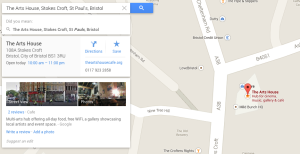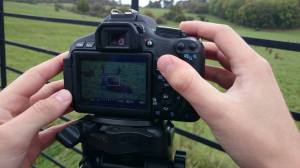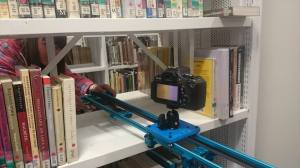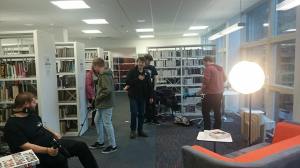Today we presented our finished media futures documentary in front of our class peers. We each spoke about our roles, what we wanted to achieve and what we thought we could have done better. I spoke about how we wanted to create a ‘show don’t tell approach’ by not using a voiceover and the types of equipment I used to film the interview and cutaways.
I realized while watching our own work and the other group’s work that our documentary lacked substance due to the fact that on watching it, it seemed like a stylised interview with intermittent cutaways, rather than a documentary, or maybe a snippet from a longer documentary. Next time, I am aware that we need to put together a comprehensive, detailed shot list as one of the first tasks so we are all aware of what we need to shoot and how much we need to shoot.
I am, however, mostly with how it turned out. The interview went really well and, visually, I think it’s really interesting. The fact we filmed our interview on two cameras (both DSLRs) gives it a dynamic feel, with one static camera and the other one capturing different angles of James Dalby speaking, annotating with his hands and different shots of the library where we hosted our interview. I noticed that this was a technique that no one else had used, which made me feel proud of us as a group.
We weren’t too keen on the idea of a formulaic, chronological documentary with a perfunctory narration over shots of the Clifton suspension bridge, so we instead went for a different style, which was fun to work with but possibly slightly ambitious at this point as our first production. Still, I would rather try something new and a little different and learn some valuable lessons than sticking with what we know. I like to be ambitious in my work, and if it doesn’t come out prefect first time then at least I can identify what can be done better next time.
The things I didn’t like about how the final edit turned out was the fact that the music that decided on during the editing process was too upbeat and loud to go along with the interview. In some parts it looked as though our interviewee, James Dalby, was almost rapping along with the music, giving the overall interview a strange, slightly humorous feel. I also felt as though the footage of the interview could have been edited together better because in some parts we had the audio from one clip being played over another shot of Dalby speaking – the class and panel mentioned this in their feedback to us after watching our documentary.
Next time, I also think we need to have better communication with our interviewee. I think that the reason he struggled with answering our questions directly was because he had hardly been briefed beforehand. It will remain a priority next time, to give our interviewee a full detailed description of what our documentary is about and what we are trying to find out from him.
Overall, though, I do really like the look of our documentary and for a first production, in such a big group (nine of us), I think we pulled it off well.





 logue because Pete had already put it all together in one file with captions. Now that we have the audio and visuals of the interview synced up, next time we meet we will be able to add the rest of the cutaways and music.
logue because Pete had already put it all together in one file with captions. Now that we have the audio and visuals of the interview synced up, next time we meet we will be able to add the rest of the cutaways and music.




